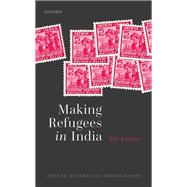Making Refugees in India
, by Kapoor, Ria- ISBN: 9780192855459 | 019285545X
- Cover: Hardcover
- Copyright: 5/3/2022
Offering a global history of India's refugee regime, Making Refugees in India explores how one of the first postcolonial states during the mid-twentieth century wave of decolonisation rewrote global practices surrounding refugees - signified by India's refusal to sign the 1951 UN Refugee Convention. In broadening the scope of this decision well beyond the Partition of India, starting with the so called 'Wilsonian moment' and extending to the 1970s, the refugee is placed within the postcolonial effort to address the inequalities of the subject-citizenship of the British empire through the fullest realisation of self-determination. India's 'strategically ambiguous' approach to refugees is thus far from ad hoc, revealing a startling consistency when viewed in conversation of postcolonial state building and anti-imperial worldmaking to address inequity across the former colonies. The anti-colonial cry for self-determination as the source of all rights, it is revealed in this work, was in tension with the universal human rights that focused on the individual, and the figure of the refugee felt this irreconcilable difference most intensely. To elucidate this, this work explores contrasts in Indians' and Europeans' rights in the British empire and in World War Two, refugee rehabilitation during Partition, the arrival of the Tibetan refugees, and the East Pakistani refugee crisis. Ria Kapoor finds that the refugee was constitutive of postcolonial Indian citizenship, and that assistance permitted to refugees - a share of the rights guaranteed by self-determination - depended on their potential to threaten or support national sovereignty that allowed Indian experiences to be included in the shaping of universal principles.






